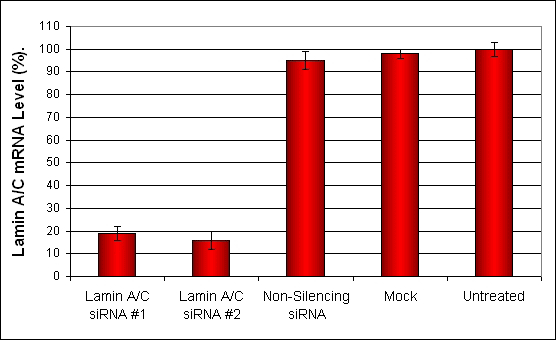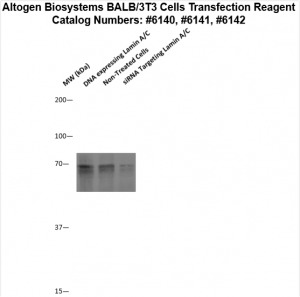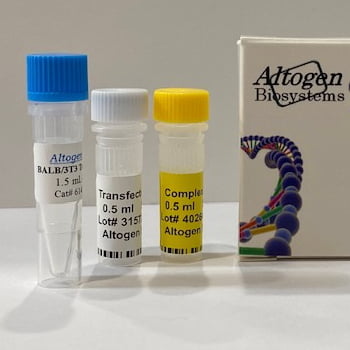Description
Purchase Orders: Click “Add to Cart” button to order, then email PO to orders@altogen.com.
Product Availability: In Stock.
Transfection Reagent for BALB/3T3 Cells (Embryo Fibroblast Cells, CCL-163)
-
A biodegradable polymer based transfection reagent – once inside the cell, the polymer degrades into smaller less toxic components reducing cell toxicity, facilitating release of the transgene, and improving transfection efficiency
-
Optimized for intracellular delivery of plasmid DNA, siRNA, microRNA, and mRNA
-
High transfection efficiency of both siRNA and plasmid DNA without compromising cell viability
-
Achieve robust siRNA uptake for dependable gene silencing
-
Effective transfection under conditions of up to 40% serum
-
Transfection kit includes Transfection Enhancer reagent
-
Gentle enough to be used for single cell analysis
-
Download in vitro BALB 3T3 transfection protocol: [PDF]
- Download BALB-3T3 CRISPR/Cas9 transfection protocol: [PDF]
- Download PowerPoint presentation for BALB/3T3 cells transfection kit: [PPT]
- UPC/GTIN/EAN: 860002089727
-
Brand: ALTOGEN®, developed and manufactured by Altogen Biosystems
Transfection Efficiency:
Reagent exhibits at least 79% transfection efficiency of siRNA delivery. Transfection efficiency was determined by qRT-PCR.
Transfection Protocol and MSDS:
Download Altogen Biosystems BALB 3T3 Transfection Protocol: [PDF]
Download MSDS: [PDF]
BALB/3T3 Cell Line:
Stem cell therapy is the use of stem cells for treatment or prevention of different diseases, including stroke, spinal cord injury, Alzheimer’s disease, Parkinson’s disease and other neurological conditions. Connective tissue comprises fibroblasts, active cells that help maintain tissue metabolism. Mouse embryonic fibroblasts nourish embryonic stem cells by secreting growth factors in addition to providing a cellular matrix to promote cell growth. Embryonic stem cells are a widely-used means for cell and molecular biology research, and mouse fibroblast cell lines are imperative for the proper growth of stem cells. While being a powerful research tool, these cells are susceptible to environmental factors; therefore, utmost care must be taken while utilizing them for research. Using a high-efficiency transfection reagent provides a higher degree of experimental reproducibility and low cytotoxicity. The BALB cell line (also known as 3T3 clone A31) was established in 1968 from fibroblast tissues found in BALB/c mouse (Mus musculus) embryos. This cell line could be useful for studying embryonic tissue of mammals, such as stem cells and as a transfection host in a variety of cell biology research. Altogen Biosystems synthesizes biodegradable polymer-based high-efficiency transfection reagent kits for the BALB/3T3 mouse embryo fibroblast cell line.
BALB/3T3 is a cell line that was derived from a mouse embryo. It is commonly used in cell biology research, particularly in studies of cell growth, differentiation, and transformation. BALB/3T3 cells are adherent and grow in vitro as monolayer cultures. They have a fibroblast-like morphology and exhibit contact inhibition, a property that allows them to form a confluent monolayer and arrest cell division when they come into contact with neighboring cells. BALB/3T3 cells are often used as a model system for studying cell cycle regulation and the molecular mechanisms of cell transformation. BALB/3T3 cells are particularly useful for investigating the effects of oncogenes and other genetic alterations on cell growth and transformation. They can be transformed by viral oncogenes or by exposure to chemical carcinogens, and have been used to study the genetic and biochemical changes associated with malignant transformation. BALB/3T3 cells have also been used to develop assays for screening potential cancer therapeutics. In summary, BALB/3T3 cells are a valuable cell line in biomedical research due to their utility in studying cell growth, differentiation, and transformation, particularly in the context of cancer biology.
Data:

Figure 1. siRNAs targeting Lamin A/C mRNA or non-silencing control siRNA were transfected into BALB 3T3 cells following the recommended protocol. At 48 hours post-transfection the cells were analyzed by qRT-PCR for Lamin A/C gene expression levels. 18S rRNA levels were used to normalize the Lamin A/C data. Values are normalized to untreated sample. Data are means ± SD (n=4).

Figure 2. Protein expression of Lamin A/C in BALB/3T3 cells. DNA plasmid expressing Lamin A/C or siRNA targeting Lamin A/C were transfected into BALB/3T3 cells following Altogen Biosystems transfection protocol. At 72 hours post-transfection the cells were analyzed by Western Blot for protein expression levels (normalized by total protein, 10 µg of total protein loaded per each well). Untreated cells used as a negative control.
Selected in vivo transfection product citations (ALTOGEN® IN VIVO Transfection Kits used in the following publications):
- Am J Pathology. 2010 177(4):1870-80. Role of ocular complement factor H in a murine model … Lyzogubov et al [PDF]
- Circulation Research. 2010 15;107(8). Kruppel-like factor-4 transcriptionally regulates … Cowan et al [PDF]
- Hypertension. 2012 59(1):158-66. Role of uncoupled endothelial nitric oxide synthase … Gao et al [PDF]
- Hypertension. 2015 65(2):430-9. Neurokinin 3 receptor and phosphocholine transferase… Parchim et al [PDF]
- Gastroenterology. 2011 141(2) Differential type I interferon-mediated autophagic trafficking … Desai et al [PDF]
Altogen Biosystems:
Altogen Biosystems is a life sciences company that offers cell type-specific and pre-optimized transfection products, elecroporation kits, and in vivo delivery reagents. Advanced formulation of reagents and optimized transfection protocols provide efficient intracellular delivery of protein, DNA, mRNA, shRNA and siRNA molecules. Read more about transfection technology at Altogen’s Transfection Resource.
Altogen CRO Contract Research Services:
Altogen Labs provides GLP-compliant contract research studies for preclinical research, IND applications, and drug development. Biology CRO services include: Xenograft models (90+), development of stable cell lines, ELISA assay development, cell-based and tissue targeted RNAi studies, safety pharm/tox assays, and other studies (visit www.AltogenLabs.com).
Volume Options:
- 0.5 ml (Catalog #6140)
- 1.5 ml (Catalog #6141)
- 1.5 ml CRISPR (Catalog #2112)
- 8.0 ml (Catalog #6142)
Purchase Orders: Click “Add to Cart” button to order, then email PO to orders@altogen.com.
Product Availability: In Stock.





